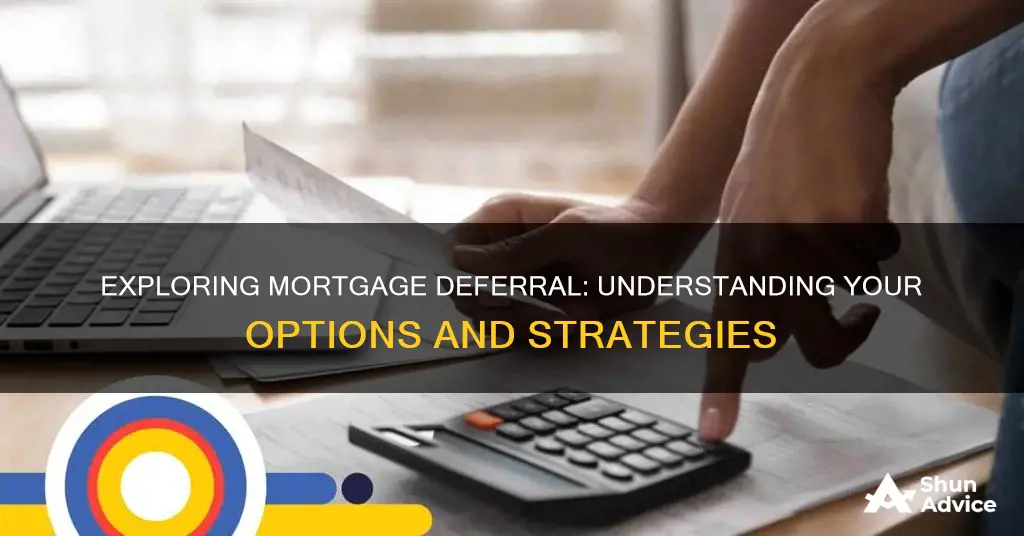
If you're struggling to make your mortgage payments, you may be considering deferring them. Mortgage deferment is an option that allows you to delay repaying overdue payments until the end of your loan term, and interest does not accrue on these payments. To qualify for a mortgage deferment, you'll typically need to provide proof of financial hardship, such as job loss or medical emergencies, and have a history of on-time payments. It's important to remember that deferment is not a temporary pause on payments but a reallocation of missed payments, and you'll need to pay back the skipped payments in a lump sum. Before deciding on deferment, it's recommended to consult your lender and explore other options, such as forbearance, which allows you to temporarily pause or reduce payments.
How do I defer my mortgage?
| Characteristics | Values |
|---|---|
| Definition | Deferment is an extension of forbearance, allowing borrowers to move missed mortgage payments to the end of their loan term. |
| Difference from Forbearance | Forbearance is a temporary pause or reduction in mortgage payments, whereas deferment is not a temporary pause but a reallocation of missed payments. |
| Interest | Interest does not accrue on the amount owed during deferment. |
| Eligibility | To be eligible for deferment, you must have a history of on-time payments and be able to provide proof of financial hardship. Specific criteria include having a mortgage backed by Fannie Mae or Freddie Mac, a conventional first-lien mortgage loan, and more than 36 months left on your loan term. |
| Repayment | Deferred payments are typically repaid in a single balloon payment at the end of the loan term. |
| Application Process | Connect with your loan servicer or lender to start the application process and discuss available options. |
| Alternatives | If deferment is not a suitable option, alternatives such as loan modification or selling your home may be considered. |
| Number of Deferments | A borrower who gets a deferment must typically wait at least 12 months between deferments. |
| COVID-19 and Natural Disasters | Deferment programs related to COVID-19 or natural disasters may waive the waiting period between deferments. |
| Voluntary or Mandatory | As of October 1, 2023, the deferment program is a mandatory option for mortgage servicers. |
| Temporary Financial Hardship | Deferment can be a lifeline during temporary financial hardship, allowing homeowners to keep their homes while facing setbacks such as job loss, medical emergencies, or other unexpected expenses. |
What You'll Learn

What is the difference between forbearance and deferment?
If you're struggling to make your mortgage payments, you may be able to get relief from your loan servicer. This relief often comes in two types: loan deferment or forbearance. Both options allow you to temporarily pause payments, but they function differently depending on the type of loan you have and who owns the debt.
Forbearance is a process that can help if you're struggling to pay your mortgage. Your servicer or lender arranges for you to temporarily pause mortgage payments or make smaller payments. You still owe the full amount, and you pay back the difference later. Forbearance can help you deal with a financial hardship, such as damage to your home, unexpected medical costs, or job loss. It's important to note that forbearance does not erase or decrease the amount you owe on your mortgage, and you have to repay any missed or reduced payments. Depending on the terms of your forbearance, you may or may not have to pay more in interest and other fees due to paused payments.
On the other hand, deferment is an option for dealing with overdue mortgage payments. It involves taking the payments you missed and setting them aside to be paid at the end of your loan. This amount becomes payable, often in a lump sum, once the loan term ends, when you sell your home, or if you choose to refinance to another mortgage. The amount owed during a deferment will not accrue interest. Deferment is one possible repayment option when exiting forbearance.
The main difference between forbearance and deferment lies in how you're expected to pay back the skipped payments. With forbearance, you typically pay back the missed payments once your financial situation improves, either by increasing your monthly payments or by taking out a new loan. With deferment, the missed payments are tacked on to the end of your loan, essentially extending the life of your loan while keeping monthly payments manageable in the future. However, depending on the terms of your loan, unpaid interest may be added to the total amount and accrue from there, meaning you'll end up paying interest on interest.
A Guide to Assuming a VA Mortgage
You may want to see also

How do I qualify for mortgage relief?
To qualify for mortgage relief, you must be experiencing financial hardship due to circumstances such as job loss, medical expenses, or economic downturns. The eligibility criteria vary depending on the specific mortgage relief program, but typically, you will need to demonstrate financial hardship and meet the criteria set by the lender or government agency offering relief. This involves submitting documentation of your income, expenses, and reasons for your hardship.
One option for mortgage relief is a forbearance program, which allows you to temporarily suspend mortgage payments while you address your financial situation. During the forbearance period, interest may still accrue, but you can avoid foreclosure. Once your financial situation improves, you can work with your lender to resume payments and discuss options for repaying the accrued interest, which may include extending the loan term to keep monthly payments manageable.
The Home Affordable Foreclosure Alternatives (HAFA) Program provides protection and financial assistance to homeowners who cannot qualify for a loan modification and are facing foreclosure. The HomeReady program is designed for creditworthy, low-income borrowers, offering a low down payment for first-time or repeat homebuyers.
The US Department of Housing and Urban Development (HUD) offers the FHA Streamline program, which allows homeowners who have made at least three consecutive on-time payments on their existing FHA loan to qualify for refinancing with more lenient requirements. Additionally, the government's RefiNow program assists homeowners with less-than-perfect credit in qualifying for refinancing, specifically targeting families affected by the COVID-19 pandemic with Fannie Mae-backed loans.
To determine your eligibility for mortgage relief, you should review the specific criteria of the programs you are interested in and reach out to your lender or a HUD-approved housing counselor to discuss your options.
Becoming a Mortgage Officer: Texas Requirements and Steps
You may want to see also

How many times can I defer my mortgage?
Deferring mortgage payments can provide immediate financial relief for those who are concerned about covering their essential bills and day-to-day expenses. However, it is worth carefully considering the potential future financial impacts.
If you decide to defer payments, you will not be paying any principal or interest for those months. Ultimately, this could result in a higher cost of borrowing over the life of the mortgage. Reduced monthly payments can also lead to a longer repayment period, which results in more interest over time.
There is no standard number of times a mortgage can be deferred. This is because the number of times a mortgage can be deferred depends on a variety of factors, such as the lender, the borrower's financial situation, and the terms of the loan. Some lenders may allow for multiple deferrals, while others may only permit a single deferral under certain circumstances. It is important to carefully review the terms of your loan and discuss your options with your lender or financial advisor to understand how many times you may be able to defer your mortgage payments.
Additionally, it is important to consider the potential consequences of deferring mortgage payments. While deferring payments can provide short-term relief, it may lead to financial strain in the long run. Any unpaid interest that accrues during the deferred period will be added to the outstanding principal on the mortgage, resulting in higher overall costs. Furthermore, simply avoiding a payment without going through the formal deferral process can have negative consequences, including a delinquent mortgage, a negative impact on credit rating, and potential foreclosure. Therefore, it is crucial to work with your lender or financial advisor to set up any necessary deferrals and explore alternative options to manage your financial situation.
Strategies to Bypass Mortgages: Exploring Alternative Routes
You may want to see also

What are my options if I can't pay my mortgage?
If you're worried about missing a mortgage payment, the best thing to do is get in touch with your lender to see if there are hardship programs you might qualify for. Many lenders have programs to help people avoid foreclosure. Your lender might offer you the option to change when you pay, for example, by taking a break from payments or reducing the amount you pay for a short period. You could also arrange to repay what you owe at a later date by adding it to the capital outstanding on the mortgage, which is called 'capitalising the arrears'.
If you have a mortgage backed by Fannie Mae or Freddie Mac, you might be able to qualify for a mortgage deferment. This is a temporary pause or reduction in mortgage payments, which can be requested before any missed payments. During the forbearance period, you can skip or make reduced payments for a set period, typically ranging from a few months to a year. Mortgage deferment involves moving the missed payments to the end of the loan term, to be repaid as a single balloon payment.
If you've lost your job or your income unexpectedly, check if you have mortgage payment protection insurance. You might be able to switch to cheaper mortgage protection, building, or contents insurance. You could also give up or sell off your endowment policy, which would provide a lump sum of money to help pay off the debt.
If your income and savings are low, and you're entitled to benefits, you might be able to get a government loan to help with mortgage interest payments. This is called Support for Mortgage Interest. You can also contact a HUD-approved housing counseling agency to get free, expert assistance on avoiding foreclosure.
Mortgage and Marriage: Adding a Spouse to Home Loans
You may want to see also

What is the process for deferring my mortgage?
Mortgage deferment can be a good option if you're facing temporary financial hardship and want to keep your home. It's important to remember that lenders are there to help and will work with you to find the best solution for your situation.
To qualify for a mortgage deferment, you typically need to meet certain criteria. These may include having a mortgage backed by a specific entity, a conventional first-lien mortgage loan, a history of on-time payments, and proof of financial hardship. It's important to note that the exact requirements can vary from lender to lender, so it's always best to consult with your loan servicer directly.
The process of applying for a mortgage deferment typically involves the following steps:
- Contact your loan servicer or lender as soon as possible to discuss your options and understand the eligibility criteria.
- Provide documentation and evidence of your financial situation, such as proof of job loss or medical emergencies.
- Work with your lender to modify your loan terms and create a plan for repayment.
- Understand the repayment expectations, as you will likely need to pay back the deferred amount in a lump sum at the end of the loan term.
It's important to be proactive and reach out to your mortgage servicer as soon as you anticipate any difficulties in making your payments. They can help you explore all available options and find the best solution for your financial situation.
Adding Your Child's Name to Your Mortgage: What You Need to Know
You may want to see also
Frequently asked questions
Forbearance is a temporary pause or reduction in mortgage payments, allowing you to skip or reduce payments for a set period, typically up to a year. During this time, interest still accrues on the loan. Deferment, on the other hand, is an extension of forbearance, where the missed payments are moved to the end of the loan term, often as a single balloon payment, and interest does not accrue on the deferred amount.
The exact requirements vary across lenders, but generally, you need to provide proof of financial hardship, such as job loss or medical emergencies. You also need to have a history of on-time payments and meet specific loan criteria, such as having a conventional, first-lien mortgage loan and a minimum of two months of delinquency.
Contact your loan servicer or lender to discuss your options and initiate the application process. Be proactive and reach out as soon as you know you will have difficulty making payments. Provide documentation and evidence of your financial situation to support your request for deferment.
If you do not qualify for mortgage deferment or are concerned about repaying the deferred amount in a lump sum, consider alternatives such as loan modification or selling your home. Consult with your lender to explore the best path forward for your financial situation.







